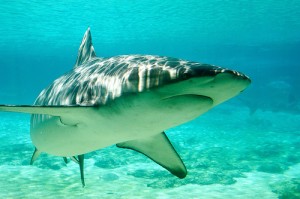Shark Culling Won’t Reduce Shark Attacks

Does shark culling work?
Shark attacks have seemingly been rising in Hawaii and Australia – places known to host a burgeoning population of surfers and ocean sports enthusiasts.
In this article
Culling sharks in Australia?
And Australian officials have recently decided to encourage the catching and killing of sharks off the Australian coasts. In some locations they are setting drum lines to snare sharks near the coastline. Colin Barnett, Premier of Western Australia suggested to reporters that the sharks will be hunted as long as they threaten beach goers:
“We will always put the lives and safety of beachgoers ahead of the shark. This is, after all, a fish — let’s keep it in perspective,” Barnett told a group of reporters.
The question, however, is whether this attempt to reduce sharks will do any good. In fact, there is reason to believe that the setting of bait necessary in order to attract sharks – and the dead sharks left on the culling lines – will also attract more sharks into the coastal waters.
This concept is supported by Shark specialist and biologist Ryan Kempster, who stated:
“When you have dead animals hanging on the line, this attracts in more so essentially you’re attracting more animals to the area.”
These drum lines also snare innocent animals such as dolphins and turtles.
Will catching sharks reduce attacks?
And there is a severe lack of evidence that the catching of sharks will indeed reduce their propensity to attack humans.
Officials from the International Humane Society argued against the hypothesis that culling sharks will reduce shark attacks. Senior program manager Alexia Wellbelove said:
“The proposed policy and consideration by the federal environment minister lacks any real scientific approach, and fails to sufficiently consider the wider marine implications of the program.”
The question for surfers and other ocean sports enthusiasts is whether they want to become enemies of the very ecosystem they would like to participate in. We know that sharks are extremely sensitive to emotions and fear. A violent approach as we enter the oceans will most certainly produce more hostility.
We are reminded of many other animals such as bears and certain tigers that were not aggressors against humans until their turf was threatened and they began to be slaughtered.
The other important element is that sharks maintain an important part of the ecosystem. Without sharks patrolling the waters, other marine life will become out of balance.
In fact, many sharks have now become endangered species as shark fin harvesting has become rampant as a result of huge demand from China.
Over-exploitation of sharks
Over 100 different species of sharks are now under pressure, according to the Convention on International Trade in Endangered Species of Wild Fauna and Flora and the International Food and Agricultural Organization. According to their reports,
“many of these shark species are so overexploited that even their long-term survival can no longer be guaranteed.”
In a news release by the Conservation IUCN’s Red List of Theatened Species, nearly 25% of all sharks are now “threatened with extinction” according to a study by the IUCN Shark Specialist Group.
Dr Nick Dulvy, IUCN SSG Co-Chair and Canada Research Chair summarized the results of the study:
“Our analysis shows that sharks and their relatives are facing an alarmingly elevated risk of extinction. In greatest peril are the largest species of rays and sharks, especially those living in shallow water that is accessible to fisheries.”
Yes, sharks may seem threatening. But shark attacks present a significantly lower risk of death than being struck by lightning. Do we really want to remove these beautiful ancient creatures and their important role in our ecosystem forever?
Statistics show that driving a car presents significantly more chance of being killed than the potential of a shark attack. Perhaps we should consider taking a few cars off the road before we turn the ocean’s ecosystem upside down.
REFERENCES:
How A Controversial Shark Culling Program Is Tearing Australia Apart. Huff Post Green. Huggington Post. Nov. 2014.
Ricky Gervais joins celebrities in opposing WA shark cull. January, 2014.
Ling L. Shark fin soup alters an ecosystem. CNN. 2014.
The Red List News Release: A quarter of sharks and rays threatened with extinction. 21 Jan 2014.















